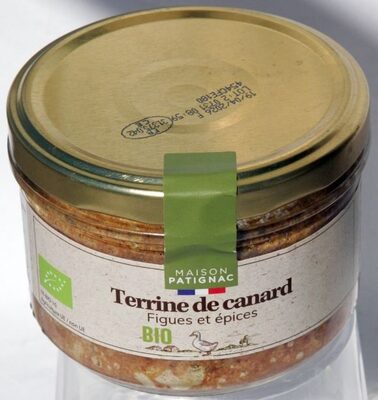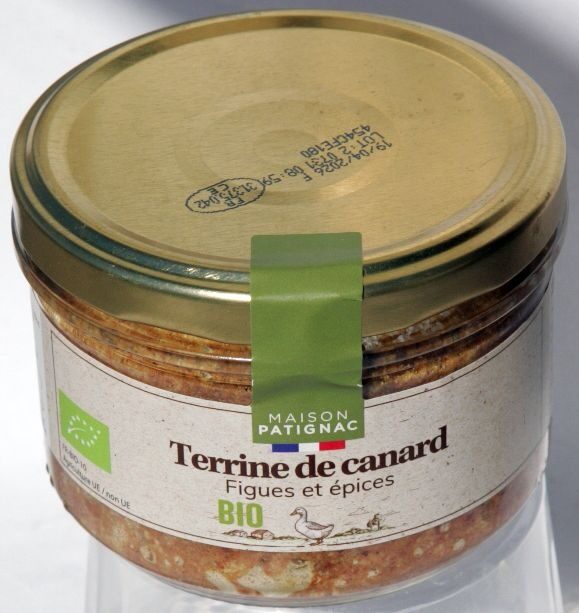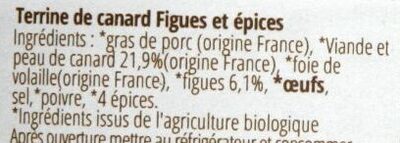Help us make food transparency the norm!
As a non-profit organization, we depend on your donations to continue informing consumers around the world about what they eat.
The food revolution starts with you!
Terrine de canard, figues et épices, Bio - Maison Patignac - 180g
Terrine de canard, figues et épices, Bio - Maison Patignac - 180g
This product page is not complete. You can help to complete it by editing it and adding more data from the photos we have, or by taking more photos using the app for Android or iPhone/iPad. Thank you!
×
Barcode: 3337530510073 (EAN / EAN-13)
Quantity: 180g
Brands: Maison Patignac
Categories: Meats and their products, Meats, Prepared meats, Terrines, Poultry terrines, Duck terrines
Labels, certifications, awards:
Organic, EU Organic, Non-EU Agriculture, EU Agriculture, EU/non-EU Agriculture, FR-BIO-10, Green Dot

Origin of the product and/or its ingredients: Porc, canard, volaille France
Origin of ingredients: fr:Canard France, fr:Porc France, fr:Volaille France
Manufacturing or processing places: 31310 Montesquieu-Volvestre
Traceability code: FR 31.375.042 CE - Montesquieu-Volvestre (Haute-Garonne, France)
Link to the product page on the official site of the producer: https://www.patignac.com/
Countries where sold: France
Matching with your preferences
Health
Ingredients
-
8 ingredients
French: *Gras de porc (origine France), *viande et peau de canard 21,9% (origine France), *foie de volaille (origine France), *figues 6,1%, *œufs, sel, *poivre, *4 épices *ingrédients issus de l'agriculture biologiqueAllergens: Eggs
Food processing
-
Processed foods
Elements that indicate the product is in the 3 - Processed foods group:
- Category: Prepared meats
- Category: Terrines
- Ingredient: Salt
Food products are classified into 4 groups according to their degree of processing:
- Unprocessed or minimally processed foods
- Processed culinary ingredients
- Processed foods
- Ultra processed foods
The determination of the group is based on the category of the product and on the ingredients it contains.
Ingredients analysis
-
May contain palm oil
Ingredients that may contain palm oil: Pork fat
-
Non-vegan
Non-vegan ingredients: Pork fat, Poultry liver, EggSome ingredients could not be recognized.
We need your help!
You can help us recognize more ingredients and better analyze the list of ingredients for this product and others:
- Edit this product page to correct spelling mistakes in the ingredients list, and/or to remove ingredients in other languages and sentences that are not related to the ingredients.
- Add new entries, synonyms or translations to our multilingual lists of ingredients, ingredient processing methods, and labels.
If you would like to help, join the #ingredients channel on our Slack discussion space and/or learn about ingredients analysis on our wiki. Thank you!
-
Non-vegetarian
Non-vegetarian ingredients: Pork fat, Poultry liverSome ingredients could not be recognized.
We need your help!
You can help us recognize more ingredients and better analyze the list of ingredients for this product and others:
- Edit this product page to correct spelling mistakes in the ingredients list, and/or to remove ingredients in other languages and sentences that are not related to the ingredients.
- Add new entries, synonyms or translations to our multilingual lists of ingredients, ingredient processing methods, and labels.
If you would like to help, join the #ingredients channel on our Slack discussion space and/or learn about ingredients analysis on our wiki. Thank you!
-
Details of the analysis of the ingredients
We need your help!
Some ingredients could not be recognized.
We need your help!
You can help us recognize more ingredients and better analyze the list of ingredients for this product and others:
- Edit this product page to correct spelling mistakes in the ingredients list, and/or to remove ingredients in other languages and sentences that are not related to the ingredients.
- Add new entries, synonyms or translations to our multilingual lists of ingredients, ingredient processing methods, and labels.
If you would like to help, join the #ingredients channel on our Slack discussion space and/or learn about ingredients analysis on our wiki. Thank you!
fr: Gras de porc, viande et peau de canard 21.9%, foie de volaille, figues 6.1%, _œufs_, sel, poivre, 4 épices- Gras de porc -> en:pork-fat - labels: en:organic - vegan: no - vegetarian: no - from_palm_oil: maybe - ciqual_food_code: 16530 - percent_min: 39.8 - percent_max: 65.9
- viande et peau de canard -> fr:viande-et-peau-de-canard - labels: en:organic - percent_min: 21.9 - percent: 21.9 - percent_max: 21.9
- foie de volaille -> en:poultry-liver - labels: en:organic - vegan: no - vegetarian: no - ciqual_food_code: 40108 - percent_min: 6.1 - percent_max: 21.9
- figues -> en:fig - labels: en:organic - vegan: yes - vegetarian: yes - ciqual_food_code: 13012 - percent_min: 6.1 - percent: 6.1 - percent_max: 6.1
- _œufs_ -> en:egg - labels: en:organic - vegan: no - vegetarian: yes - ciqual_food_code: 22000 - percent_min: 0 - percent_max: 6.1
- sel -> en:salt - vegan: yes - vegetarian: yes - ciqual_food_code: 11058 - percent_min: 0 - percent_max: 1.4
- poivre -> en:pepper - labels: en:organic - vegan: yes - vegetarian: yes - percent_min: 0 - percent_max: 1.4
- 4 épices -> fr:4-epices - labels: en:organic - percent_min: 0 - percent_max: 1.4
- volaille France
volaille -> en:poultry
Nutrition
-
Bad nutritional quality
⚠ ️Warning: the amount of fiber is not specified, their possible positive contribution to the grade could not be taken into account.⚠ ️Warning: the amount of fruits, vegetables and nuts is not specified on the label, it was estimated from the list of ingredients: 6This product is not considered a beverage for the calculation of the Nutri-Score.
Positive points: 0
- Proteins: 5 / 5 (value: 11.8, rounded value: 11.8)
- Fiber: 0 / 5 (value: 0, rounded value: 0)
- Fruits, vegetables, nuts, and colza/walnut/olive oils: 0 / 5 (value: 6.1, rounded value: 6.1)
Negative points: 21
- Energy: 5 / 10 (value: 1728, rounded value: 1728)
- Sugars: 0 / 10 (value: 3.1, rounded value: 3.1)
- Saturated fat: 10 / 10 (value: 13.6, rounded value: 13.6)
- Sodium: 6 / 10 (value: 560, rounded value: 560)
The points for proteins are not counted because the negative points are greater or equal to 11.
Nutritional score: (21 - 0)
Nutri-Score:
-
Nutrient levels
-
Fat in high quantity (39%)
What you need to know- A high consumption of fat, especially saturated fats, can raise cholesterol, which increases the risk of heart diseases.
Recommendation: Limit the consumption of fat and saturated fat- Choose products with lower fat and saturated fat content.
-
Saturated fat in high quantity (13.6%)
What you need to know- A high consumption of fat, especially saturated fats, can raise cholesterol, which increases the risk of heart diseases.
Recommendation: Limit the consumption of fat and saturated fat- Choose products with lower fat and saturated fat content.
-
Sugars in low quantity (3.1%)
What you need to know- A high consumption of sugar can cause weight gain and tooth decay. It also augments the risk of type 2 diabetes and cardio-vascular diseases.
Recommendation: Limit the consumption of sugar and sugary drinks- Sugary drinks (such as sodas, fruit beverages, and fruit juices and nectars) should be limited as much as possible (no more than 1 glass a day).
- Choose products with lower sugar content and reduce the consumption of products with added sugars.
-
Salt in moderate quantity (1.4%)
What you need to know- A high consumption of salt (or sodium) can cause raised blood pressure, which can increase the risk of heart disease and stroke.
- Many people who have high blood pressure do not know it, as there are often no symptoms.
- Most people consume too much salt (on average 9 to 12 grams per day), around twice the recommended maximum level of intake.
Recommendation: Limit the consumption of salt and salted food- Reduce the quantity of salt used when cooking, and don't salt again at the table.
- Limit the consumption of salty snacks and choose products with lower salt content.
-
-
Nutrition facts
Nutrition facts As sold
for 100 g / 100 mlCompared to: Duck terrines Energy 1,728 kj
(411 kcal)+37% Fat 39 g +49% Saturated fat 13.6 g +44% Carbohydrates 3.7 g +104% Sugars 3.1 g +346% Fiber ? Proteins 11.8 g -17% Salt 1.4 g -8% Fruits‚ vegetables‚ nuts and rapeseed‚ walnut and olive oils (estimate from ingredients list analysis) 6.1 %
Environment
-
Eco-Score D - High environmental impact
⚠ ️Select a country in order to include the full impact of transportation.The Eco-Score is an experimental score that summarizes the environmental impacts of food products.→ The Eco-Score was initially developped for France and it is being extended to other European countries. The Eco-Score formula is subject to change as it is regularly improved to make it more precise and better suited to each country.Life cycle analysis
-
Average impact of products of the same category: D (Score: 32/100)
Category: Duck terrine
Category: Duck terrine
- PEF environmental score: 0.98 (the lower the score, the lower the impact)
- including impact on climate change: 7.30 kg CO2 eq/kg of product
Stage Impact Agriculture
78.9 %Processing
14.8 %Packaging
3.0 %Transportation
2.2 %Distribution
0.9 %Consumption
0.2 %
Bonuses and maluses
-
Labels with high environmental benefits
Bonus: +15
-
EU Organic
Organic agriculture contributes to preserve biodiversity, climate, water quality and soil fertility.
Organic food is food produced by methods complying with the standards of organic farming and features practices that cycle resources, promote ecological balance, and conserve biodiversity.
-
-
Origins of ingredients with a medium impact
Bonus: +3
Environmental policy: +3
Transportation: 0
Origin of the product and/or its ingredients % of ingredients Impact France 89 %Medium Unknown 11 %High
-
Packaging with a medium impact
Malus: -14
Shape Material Recycling Impact 1 Jar Glass Recycle in sorting bin Low 1 Lid Metal Recycle in sorting bin High Terrine pot Unknown High ⚠ ️ The information about the packaging of this product is not sufficiently precise (exact shapes and materials of all components of the packaging).⚠ ️ For a more precise calculation of the Eco-Score, you can modify the product page and add them.
If you are the manufacturer of this product, you can send us the information with our free platform for producers.
Eco-Score for this product
-
Impact for this product: D (Score: 36/100)
Product: Terrine de canard, figues et épices, Bio - Maison Patignac - 180g
Life cycle analysis score: 32
Sum of bonuses and maluses: +4
Final score: 36/100
-
Carbon footprint
-
Equal to driving 3.8 km in a petrol car
730 g CO² per 100g of product
The carbon emission figure comes from ADEME's Agribalyse database, for the category: Duck terrine (Source: ADEME Agribalyse Database)
Stage Impact Agriculture
76.0 %Processing
14.6 %Packaging
5.2 %Transportation
3.6 %Distribution
0.5 %Consumption
0.1 %
Packaging
-
Packaging with a medium impact
-
Packaging parts
1 x Jar 180g (Glass: 147 g)
1 x Lid (Metal: 14.1 g)
Terrine pot
-
Packaging materials
Material % Packaging weight Packaging weight per 100 g of product Glass 91.2% 147 g 81.7 g Metal 8.8% 14.1 g 7.8 g Total 100% 161.1 g 89.5 g
-
Transportation
-
Origins of ingredients
Origins of ingredients with a medium impact
Origin of the product and/or its ingredients % of ingredients Impact France 89 %Medium Unknown 11 %High
Labels
-
EU Organic
Organic agriculture contributes to preserve biodiversity, climate, water quality and soil fertility.
Organic food is food produced by methods complying with the standards of organic farming and features practices that cycle resources, promote ecological balance, and conserve biodiversity.
Report a problem
-
Incomplete or incorrect information?
Category, labels, ingredients, allergens, nutritional information, photos etc.
If the information does not match the information on the packaging, please complete or correct it. Open Food Facts is a collaborative database, and every contribution is useful for all.
Data sources
Product added on by kiliweb
Last edit of product page on by marmotte73.
Product page also edited by openfoodfacts-contributors, roboto-app, sebleouf, teolemon, yuka.ZmFzUVBZVVJudWNqbmN3bHppR1BxL3RIbW9TSmVsT1dKZlF5SVE9PQ, yuka.sY2b0xO6T85zoF3NwEKvllcaWNvjuCLZOC7ShhGC_IqNc73Pc9JDvdD2OKs.














